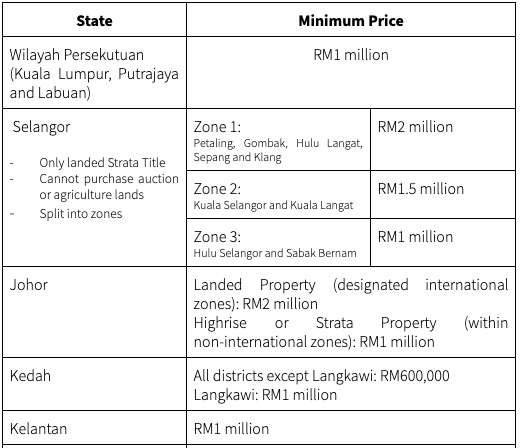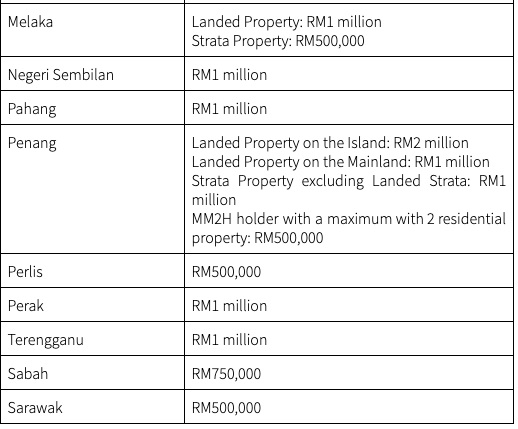When you own a property, the general position is that you can do what you want with it. While the right to own land is guaranteed by law, there are exceptions in which State Authority consent is required before transactions or dealings can be carried out. In this article, we explain the situations in which restrictions in interest are endorsed on the title of the property or imposed by law. We also discuss when and how consent can be applied for and obtained.
State Consent
Section 92 of the National Land Code 1965 ("NLC") gives indefeasible rights to the registered owner of a property. These rights include the right to transfer, charge, lease, surrender and other dealings permitted under Division IV of the NLC.
However, Section 76 of the NLC provides that the State Authority has the power to impose conditions and restrictions in interest on lands and properties as the State Authority deems fit. A restriction in interest ("Sekatan Kepentingan") is defined in section 5 of the NLC as a limitation that has been imposed by the State Authority to deal with the land. The owner of land with a restriction in interest is not allowed to carry out any dealings on the land without first obtaining written approval from the State Authority.
Restrictions on the Title
A "restriction in interest" ("sekatan kepentingan") is usually endorsed on the title of the property. Examples include:
a) Tanah yang diberi milik ini tidak boleh dipindahmilik, dipajak atau digadai melainkan dengan kebenaran pihak berkuasa negeri;
b) Tanah ini tidak boleh dipindahmilik, dipajak, dicagar dan digadai melainkan dengan kebenaran Jawatankuasa Kerja Tanah Wilayah Persekutuan Kuala Lumpur;
c) Tanah ini boleh dipindahmilik, dipajak atau digadai setelah mendapat kebenaran pihak berkuasa negeri.
A common misconception is that state authority consent is required only for properties that are under leasehold title. While it is true that leasehold lands always require State Authority's consent, some lands under freehold title may also have restrictions in interest that require consent in order to deal with the land.
For a property with a restriction in interest endorsed on the title, a landowner will have to apply for State Authority's consent before dealing with the property. Common land dealings requiring State Authority's consent are:
- Transfer of ownership; and
- Charge the property to a financial institution (e.g. for a bank loan).
Transfer of Ownership
When a sale and purchase transaction involves a property with a restriction in interest for the transfer of ownership, the Sale and Purchase Agreement entered into between the parties will usually be a conditional agreement with a Condition Precedent clause. The agreement will state that the sale is conditional upon the seller making a formal application to the relevant State Authority and obtaining the required State Authority's consent. The cost of the application for consent is typically borne by the seller.
Charge of Land
When a borrower wishes to charge a property with a restriction in interest to secure a loan from a financial institution, an application for consent to charge has to be made by the borrower. If, during a sale and purchase of a property, the purchaser intends to take a loan to finance the purchase of the property, the application for consent to charge can be done simultaneously with the seller's application for consent to transfer ownership. Although the application for consent to charge can be made subsequently, any delay in obtaining consent will then delay the release of the loan. The cost involved in an application for consent to charge will be borne by the borrower.
As land rulings vary from state to state in Malaysia, the cost and time taken to obtain approval from the relevant State Authority varies too.
In the event a consent application is rejected by the State Authority for any reason, an applicant can file an appeal within the time frame provided to have the application reconsidered by the State Authority.
Generally, a typical application for State Authority's consent will take at least three months. However, since there is no guarantee on how long the approval may take, it is common for a Sale and Purchase Agreement to provide a six months period from the date of the Sale and Purchase Agreement with an option to extend the deadline in the event the approval is delayed. Once the State Authority's approval has been obtained, the conditions precedent in the Sale and Purchase Agreement is fulfilled and the period to complete the Sale and Purchase Agreement starts to run.
Restrictions Imposed By Law
State Authority consent is required for some dealings even though there may not be any restriction in interest stated on the title of the land itself. Here we will cover three circumstances in which the consent of the State Authority is required by law:
- Transfer of ownership to a non-Malaysians (foreigner consent);
- Transfer of low-cost properties (low-cost consent); and
- Transfer of land reserved for Bumiputeras to non-Bumiputeras (Bumiputera consent).
Foreigner Consent
If a non-Malaysian intends to purchase property in Malaysia, he or she will have to apply for foreigner consent from the State Authority.
Section 433B of the NLC states that written approval from the State Authority is required for acquisition of property by any foreign interest. Pursuant to Section 433A of the NLC and Section 2 of the Companies Act 2016, foreign interest is defined as:
- Individuals that are not a Malaysian citizen (inclusive of Permanent Residents);
- Foreign company or institution; or
- Local company or institution with non-citizen holding more than 50% of the voting shares of the company or institution.
A foreign purchaser that fits the definition of foreign interest will have to obtain written approval from the State Authority before a property can be registered in the name of the foreign purchaser. This will involve a Condition Precedent clause in the Sale and Purchase Agreement and the completion period will commence upon obtaining foreigner consent. The cost of applying for consent falls on the foreign purchaser and not the seller of the property.
The primary consideration in an application for foreigner consent is whether the property type and purchase price meet the requirements for acquisition by foreigners. The minimum purchase price and type of property that can be acquired by foreigners differ in each state. The table below sets out these requirements:


Once the foreign purchaser has obtained foreigner consent, the Sale and Purchase Agreement becomes unconditional and will proceed to completion.
To learn more about the purchase of property by a foreigner, please read our article: How to Help Foreigners Buy Properties in Malaysia.
Low Cost Consent
Low cost consent is only applicable to property endorsed as low-cost property. Most of the time, however, the "low-cost" status is not endorsed on the property title. Hence, it is necessary to refer to the previous Sale and Purchase Agreement to confirm the "low-cost" status of the property.
Low cost properties are more common among properties in Selangor (such as Rumah Selangorku) where the application for the consent is to be filed with the Lembaga Perumahan dan Hartanah Selangor (LPHS). LPHS has imposed several conditions before a low-cost property can be purchased or transferred. The conditions imposed are aimed at encouraging homeownership among the low income and middle income group in Selangor. The conditions for low-cost home ownership can be found here.
Bumiputra Consent
The government imposes a requirement for developers to allocate a certain percentage of units in housing development projects to purchasers who are Bumiputras. Typically, these units are sold at a discount compared to those sold to non-Bumiputras. These Bumiputra units can only be purchased by persons or companies who are recognised or qualify as Bumiputra. A Bumiputra unit cannot ordinarily be transferred to a non-Bumiputra.
There are circumstances in which a Bumiputra unit may be released and sold to a non-Bumiputra. in order for such a sale to take place, the following requirements need to be met:
- the Bumiputra owner must obtain the State Authority's consent to transfer to the non-Bumiputra. The application for consent must be supported by good reasons (for example, that there is no demand for the Bumiputra unit even after a prolonged attempt to sell it to Bumiputras); and
- the owner must reimburse the developer with the Bumiputras discount from the purchase price that was enjoyed at the time of the initial purchase.
The consent and sale to a non-Bumiputra does not lift the restriction in interest endorsed on the property. The property will still be subjected to a restriction in interest and the non-Bumiputra owner will have to apply for consent to transfer ownership in order to transfer the property to another non-Bumiputra owner.
Conclusion
A restriction in interest requiring State Authority consent when selling, buying, charging or otherwise dealing with a property is likely to add complexities and delays to the transaction. It is therefore necessary and prudent to seek legal advice early in order to understand the risks involved and structure the transaction to ensure that each party's rights are fairly and adequately protected.
The content of this article is intended to provide a general guide to the subject matter. Specialist advice should be sought about your specific circumstances.

